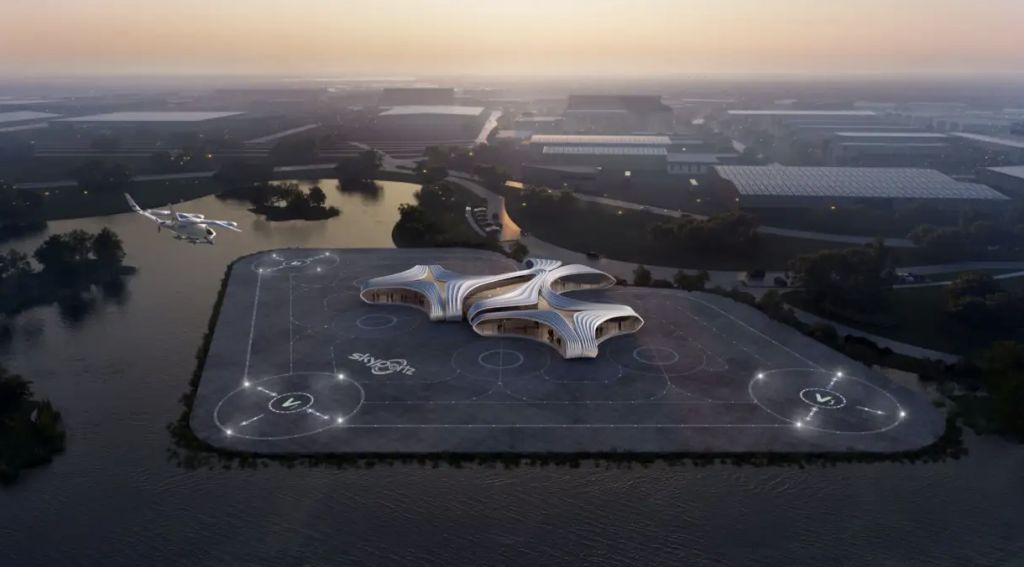
‘It's the future': Pelligra to provide hundreds of sites for air taxis
One of the country’s biggest private developers, Pelligra Group, has lent its support to the creation of a commercial air taxi service in Australia, after striking a deal with aviation infrastructure group Skyportz that will allow “vertiports” to be built across its network of sites and buildings.
Led by Ross Pelligra, the family-run developer joins national car park operator Secure Parking and Rich Listers the Spooners, who have committed to providing the sites and infrastructure that could one day ferry people across the country via zero emission electric vertical take-off and landing (eVTOL) aircraft or “air taxis” as they have been coined.
“We think it’s the future,” Mr Pelligra told The Australian Financial Review.
“If you look at the development of drone technology. You start with products, then singular people, and then you get down to the passenger side of it,” he said.
“We have a couple of hundred sites [that would be suitable]. We can start with industrial land offerings on the city fringes, that won’t be too distracting to residents, and then work our way closer to the city.”
Asked if he would one day travel in an electric air taxi, Mr Pelligra said it was the same thing as getting into a helicopter, but would be a safer aircraft.
“As the technology builds, we can also provide test sites at our industrial assets,” he said.
As with Secure Parking and its rooftop sites, the deal with Pelligra gives Skyportz first option to develop vertiports and drone delivery services on their sites.
Founded by former state politician Clem Newton-Brown, Skyportz is hoping to have a network of sites and the necessary regulatory and planning approvals in place to attract leading eVTOL companies to Australia, and set up a commercial service.
“If Australia can establish a launch vertiport network we will be in a position to attract the first of these clean, green, quiet aircraft to Australian skies,” he said.
Mr Newton-Brown said many of Pelligra’s industrial sites would be good locations for vertiports.
“Industrial areas are the low-hanging fruit in terms of getting state governments to tweak planning schemes to allow vertiport use,” he told The Australian Financial Review.
Alongside its eagerness to provide the sites for future eVTOL take-off and landing pads, Mr Pelligra believes the former Holden and Ford manufacturing plants in Victoria and South Australia that his company owns could be repurposed as air taxi manufacturing plants.
“We lost our local car manufacturing industry and I would like to see Australia develop an electric air taxi manufacturing capability. The former car assembly plants would be perfect,” said Mr Pelligra.
Numerous eVTOL aircraft are in development around the world with New York-listed Joby Aviation (backed by Toyota and Uber) and Archer Aviation, as well as Beta Technologies among the frontrunners to be the first to be certified for commercial use.
In Australia, AMSL Aero, a company founded and led by aeronautical engineer Andrew Moore and former Google executive Siobhan Lyndon has developed its own evTOL prototype that can fly at 300km per hour, and travel 250 km powered by electric batteries. Last year, AMSL Aero raised $23 million from the St Baker Energy Innovation Fund and two leading superannuation funds as it began flight testing its Vertiia aircraft.
Also backing the development of an air taxi industry, has been the Federal Government which last year released $18 million in grants under the first round of its New and Emerging Aviation Technology Partnerships.
On the regulatory front, CASA is seeking feedback on draft guidelines for the design of vertiports, while local government bodies such as Scenic Rim Regional Council in Queensland are among those pushing for early investment in the sector.
Speaking at the Avalon Airshow, Victorian Treasurer Tim Pallas said the case for zero emissions aviation was “compelling”.











